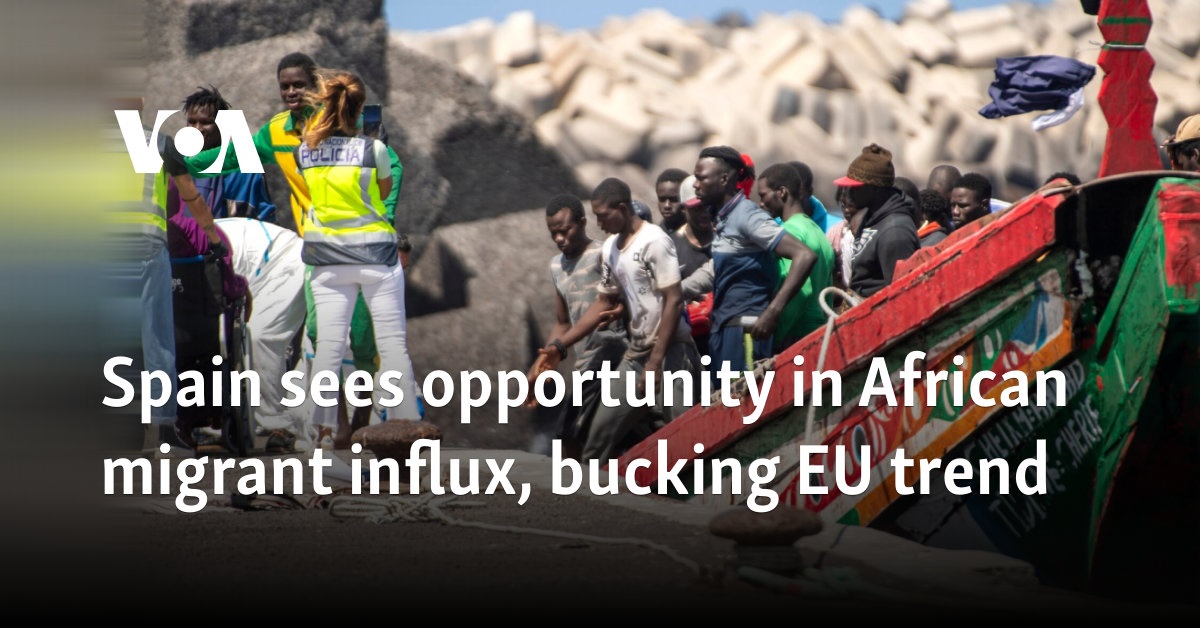This website uses cookies so that we can provide you with the best user experience possible. Cookie information is stored in your browser and performs functions such as recognising you when you return to our website and helping our team to understand which sections of the website you find most interesting and useful.


Jerez de la Frontera and London —
As many European Union countries call for the bloc to clamp down on migration amid a surge in support for right-wing political parties, Spain is bucking the trend and insists Europe’s aging population needs controlled migration to boost its economy.
The Spanish government said there is a need for young workers amid what it called a ‘demographic winter’ on the continent, and said the EU must take this into account as it forges new migration and asylum rules which aim to relieve the ongoing pressures on its external borders.
Canary Islands
More than 42,000 irregular migrants have arrived in Spain so far this year according to government figures, a two-thirds increase from 2023. Most arrive on Spain’s Canary Islands in the Atlantic Ocean, which lie more than 100 kilometers from the African coastline.
It is one of the deadliest routes to Europe. Last year alone, around 6,000 migrants died attempting the crossing, according to human rights groups. For many, the dangers are outweighed by the dream of a new life in Europe.
‘Double effort’
In a small classroom in the Andalusian city of Jerez de la Frontera, a group of migrants is taking lessons in basic Spanish. “If you make it here, the only thing you have to do is go to class, to keep learning, to talk to people. You have to be an open person, especially as an immigrant. You have to make a double effort, and that’s what we’re doing now,” said 22-year-old Malian national Macire Konare, who arrived in the Canary Islands earlier this year before being transferred to the Spanish mainland.
For the migrants, there is hope of a better life. The Spanish government also sees economic potential.
Aging population
Like many Western countries, Spain’s population is aging fast. It desperately needs young workers to build the economy and pay the taxes that fund its state pensions and healthcare. However, the country’s birth rate last year hit its lowest level ever recorded at under 1.2, among the lowest in Europe.
Speaking at a European Union leaders’ summit last Thursday, Spain’s Prime Minister Pedro Sanchez said immigration is vital for the continent.
“Our present and future competitiveness, the economic growth of our country, the sustainability of our welfare model also depend on migration. And our credibility before the rest of the world depends also on how we deal with migration policy,” Sanchez said.
“We must manage migration flows from that perspective, that of the demographic challenge, that of how to respond to the demographic winter that Europe is suffering. And I believe we have valuable tools such as the migration and asylum pact,” he added.
Migration pact
The EU’s new 10-point migration and asylum pact is due to come into force in the summer of 2026 – although Spain is calling for the agreement to be implemented earlier.
However, the details are yet to be finalized. Immigration remains one of the most controversial issues in European politics.
Right-wing, anti-immigration parties have won recent European, national or state elections in Germany, the Netherlands, Slovakia, France, Italy, Sweden and Hungary since 2022. There is growing pressure on the EU to enact tougher migration controls.
Morocco accusations
Spain’s far-right Vox party has also made inroads among voters frustrated with high immigration. Juan Sergio Redondo is the leader of the Vox party in Ceuta, one of two Spanish enclaves on the northern African coastline, along with Melilla, captured in the 15th and 16th centuries and which now form the only direct land borders between Europe and Africa.
In May 2021, around 8,000 migrants breached the Ceuta border fence in the space of three days. The frontiers continue to come under daily pressure from migrants seeking to enter Spanish and EU territory.
“Morocco uses immigrants with the idea of blackmailing Spain and the European Union,” Redondo told VOA. “That is to say, Morocco does not comply with the obligations under its agreements with the European Union for controlling migration… if it wants to obtain some economic or political benefit, it opens the doors and looks the other way.”
Morocco denies using migration to blackmail Europe and lays its own territorial claim over Ceuta and Melilla. But it’s not only the far right accusing Morocco of exploiting immigration issues.
“The government of Morocco is using migration as a tool to obtain political goals from Spain and from Europe. And the real problem is that the Moroccan government is achieving their goals through permanent blackmail,” said Jesus Verdu Baeza, an associate professor of public international law at the University of Cadiz.
Migration balance
At the same time, Spain recognizes that Europe would not survive without migration, Baeza said.
“We are a country with strong values, and we want this balance between controlling migration and offering asylum-seekers a legal way to enter and to respect their rights. We need them. Here in Spain, without migrants, we have no fruits in the supermarket. Possibly, the economy simply could not function properly,” he told VOA.
As part of its new approach, Spain is drafting a “Strategy for Africa” to deliver what it describes as the economic and social transformation of the continent, “with a focus on young people.”
“Spain is increasingly aware that Africa's present and future, its prosperity, as well as its security and progress towards truly inclusive and sustainable development, are strategic interests of the highest order for our nation. The desire for a closer partnership with Africa also reflects deep-rooted values among the Spanish people. Therefore, the new strategy cements the African continent as a priority, with a greater focus on West Africa and the Sahel,” according to an August press release from the Spanish Ministry of Foreign Affairs.
EU patrols
While seeking to facilitate legal migration, Spain is trying to stop irregular migrants arriving on its shores. Madrid wants the EU’s border agency Frontex to seek permission to patrol African coastlines to intercept the migrant boats.
During a tour visit to west Africa in August, Prime Minister Pedro Sanchez signed agreements with Mauritania and Gambia to tackle people smuggling. “It is also essential that people who have arrived illegally in Spain return to their own countries. Mainly because such a return sends a clear and strong message of deterrence to the mafias and those who put themselves in their hands,” Sanchez said at a press conference in Senegal on August 28.
Migrant warning
Spain is seeking a long-term solution to migration that works for Africa and for Europe – and an end to the deadly journeys across the Atlantic.
Twenty-one-year-old Ahmed Qarrab, who traveled to the Canary Islands from Morocco, offered a message to others considering the same journey.
“I spent three days at sea. The truth is that it was terrible. I want to give some advice to my countrymen and friends: do not come by boat, because it is very dangerous. If you want to come here, you have to find a legal way,” he told VOA.
Alfonso Beato contributed to this report.



 Africana55 Radio
Africana55 Radio 
